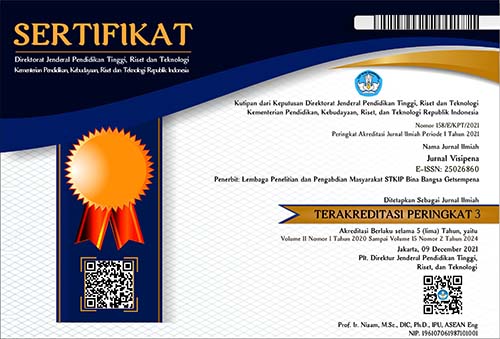THE RELATIONSHIP BETWEEN TEACHER INTERPERSONAL BEHAVIOR AND STUDENT ATTITUDE TOWARD SCIENCE LEARNING IN PRIMARY SCHOOL: INDONESIAN CASE STUDY
Abstract
This study proposes to assess the relationship between student perceptions on teacher interpersonal behavior and student attitude toward Science in Indonesian Primary school. This research engaged 143 students from SDN 47 Jambi, Indonesia. To gather the data, two types of questionnaires were used; Test of Science Related Attitude (TOSRA) and the Indonesian version of the Questionnaire Teacher Interpersonal (QTI). SPSS program were applied to process the data statistically. The result shows that the questionnaires are relatively reliable for Indonesian primary students. Acceptability of Cronbach alpha coefficient was found in both actual and preferred situation. The findings also reveal that from the students’ view, their teachers have relatively good Leadership and Understanding in the classroom, less Uncertainty, Dissatisfaction and Admonishment toward students. However, the students perceive to some extent unfavorable perceptions on their Freedom and teacher Strictness. Another analysis describes that there are significant differences between actual and ideal perceptions on the whole scale of QTI except on Uncertainty. Furthermore, between male and female perceptions, this study finds that there are significant differences on Helping, and Strictness. Lastly, the multiple correlation analysis explaines that there is a correlation between the scale of QTI and Enjoyment toward science, in which Uncertainty and Admonishment scales are significantly negative affect students’ enjoyment in science classroom.
Downloads
References
Brekelmans, M., Wubbels, T., & Creton, H. A. (1990). A study of student perceptions of physics teacher behaviour. Journal of Research in Science Teaching, 27, 335–350.
Brok, P. den, Fisher, D., & Koul, R. (2005). The importance ofteacher interpersonal behaviour for secondary science students’ attitudes in Kashmir. Journal of Classroom Interaction, 40(2), 5–19.
Brok, P. den, Fisher, D., & Scott, R. (2005). The importance of teacher interpersonal behaviour for student attitudes in Brunei primary science classes. International Journal of Science Education, 27, 765–779.
Brok, P.den, Brekelmans, M., & Wubbels, T. (2004). Interpersonal teacher behaviour and student outcomes. School Effectiveness and School Improvement, 15 (3/4), 407-442.
Evans, H. (1998). A study on students’ cultural background and teacher-student interpersonal behaviour in Secondary Science classrooms in Australia. Unpublished doctoral dissertation. Perth: Curtin University of Technology.
Fisher, D., Waldrip, B., & den Brok, P. (2005). Students’ perceptions of primary teachers’ interpersonal behaviour and of cultural dimensions in the classroom environment. International Journal of Educational Research, 43, 25–38.
Goh, S. C., & Fraser, B. J., (1998). Teacher interpersonal behaviour, classroom environment and student outcomes in primary mathematics classes in Singapore. Learning Environments Research, 1, 199-229.
Henderson, D. G. (1995). A study of the classroom and laboratory environments and student attitude and achievement in senior Secondary Biology classes. Unpublished doctoral dissertation. Perth: Curtin University of Technology.
ICIRE, (2010). the International Conference on Interpersonal Relationships in Education organised in Boulder, Colorado, the United States of America.
Khine, M. S. (2002). Study of learning environments for improving science education in Brunei. In M. S. Khine & S. C. Goh (Eds.), Studies in educational learning environments (pp. 131–152). Singapore: World Scientific.
Kyriakides, L. (2005). Extending the comprehensive model of educational effectiveness by an empirical investigation. School Effectiveness and School Improvement, 16, 103–152.
Lee, S. S. U., Fraser, B. J., & Fisher, D. L. (2003). Teacher-student interactions in Korean high school science classrooms. International Journal of Science and Mathematics Education, 1, 67–85.
Margianti, E. S. (2002). Learning environments research in Indonesia. In M. S. Khine & S. C. Goh (Eds.), Studies in educational learning environments (pp. 153–168). Singapore: World Scientific.
Rawnsley, D.G. (1997). Associations between classroom learning environments, teacher interpersonal behaviour and student outcomes in secondary Mathematics classrooms. Unpublished doctoral dissertation. Perth: Curtin University of Technology.
Telli, S., den Brok, P., & Cakiroglu, J. (2007). Students’ perceptions of science teachers’ interpersonal behaviour in secondary schools: Development of a Turkish version of the Questionnaire on Teacher Interaction. Learning Environments Research, 10, 115–129.
Wahyudi and Treagust F. (2006). Science education in Indonesia: a class room learning environment perspective. In Fisher D.L and Khine M.S. Contemporary approach to research on learning environment. World Scientific Publishing, Singapore. 221-242.
Wei, M., & Onsawad, A. (2007). English teachers’ actual and ideal interpersonal behaviour and students’ outcomes in secondary schools of Thailand. The Journal of Asia TEFL, 4(2), 1–29.
Wubbels, Th. (1993). Teacher-student relationships in science and mathematics classes (What research says to the science and mathematics teacher, No.11). Perth, Australia: National Key Center for School Science and Mathematics, Curtin University of Technology.
Wubbels, Th., & Levy, J. (1991). A comparison of the interpersonal behavior of Dutch and American teachers. International Journal of Intercultural Relations, 15, 1–18.
Wubbels, Th., & Levy, J. (1993). Do you know what you look like? Interpersonal relationships in education. London: Falmer.
Wubbels, Th., Brekelmans, M., den Brok, P., & van Tartwijk, J. (2006). An interpersonal perspective on classroom management in secondary classrooms in the Netherlands. In C. Evertson & C. S. Weinstein (Eds.), Handbook of classroom management: Research, practice and contemporary issues (pp. 1161–1191). New York: Lawrence Erlbaum Associates.




















